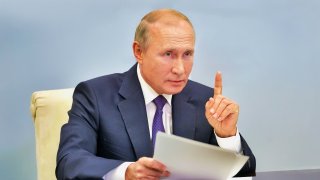VIDEO: Russia's Changing Profile and Influence in Central Asia
Russia’s full-scale invasion of Ukraine in February 2022 has had a significant impact on its relations with the states of Central Asia. In some quarters, it has led to new efforts to further de-colonialize from the Tsarist and Soviet legacies. Western sanctions have altered regional economic supply chains, and the recent influx of Russians has considerably changed migration patterns.
Russia’s full-scale invasion of Ukraine in February 2022 has had a major impact on its relations with the states of Central Asia. It has given rise to new efforts in some quarters to further de-colonialize from the Tsarist and Soviet legacies. Western sanctions have altered regional economic supply chains, and the large recent influx of Russians to the region has greatly changed migration patterns. Focusing on empirical evidence, this discussion will seek to illuminate how the Central Asian states and peoples pursue their interests under new circumstances.
On February 22, the Center for the National Interest hosted the first in a series of monthly seminars organized by the Center for the National Interest's Central Asia Connectivity Project. Note: the Center for the National Interest is the publisher of the National Interest. You can watch the full event below.
—Gavin Helf is a Senior Expert on Central Asia for the U.S. Institute of Peace, where he works on Kazakhstan, Kyrgyzstan, Tajikistan, Turkmenistan, and Uzbekistan. Before joining USIP, he worked as a senior democracy and governance advisor in the USAID Asia and Middle East bureaus. He studied, lived, and worked in the USSR and its successor states from 1984-2007, mostly in Central Asia and the Caucuses, with nongovernmental organizations and USAID.
—Dana Masalimova is a Fellow at the Davis Center for Russian and Eurasian Studies at Harvard University. She is a former diplomat with the Foreign Service of Kazakhstan and in 2021 was appointed Alternate Permanent Representative to the International Maritime Organization. She previously served as head of economic affairs at the Embassy of Kazakhstan in London and as a political affairs officer in Washington, DC.
—Eric McGlinchey is Associate Professor of Politics at the Schar School of Policy and Government at George Mason University. He is the author of Chaos, Violence, Dynasty: Politics and Islam in Central Asia (University of Pittsburgh Press, 2011) and, in addition to his academic publications, has offered commentary for the New York Times, the Washington Post, and CBC/Radio-Canada.
Andrew Kuchins, Senior Fellow at the Center for the National Interest, moderated the discussion.

